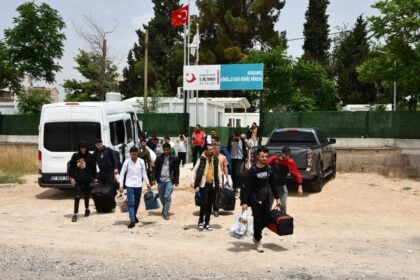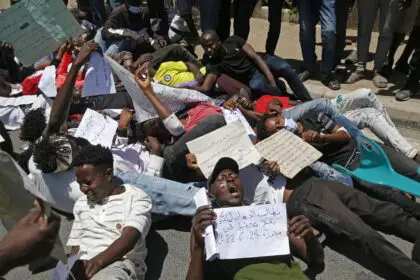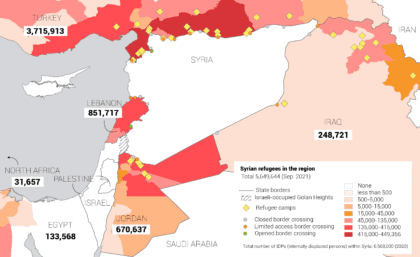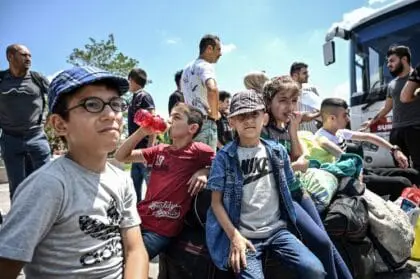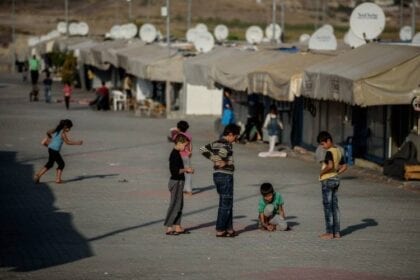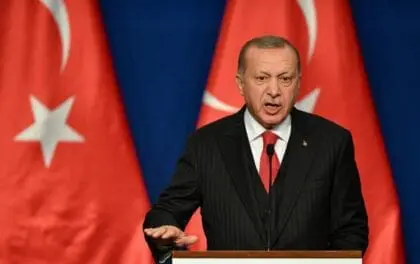
Bulent KILIC / AFP
Introduction
The concept of human rights has become a well-known and widely accepted term to use. Varying interpretations are possible, with differences usually being based on cultural background. Nonetheless, most of these understandings consciously or subconsciously include the basic rights outlined in the United Nations’ Universal Declaration of Human Rights (UDHR).
The United Nations General Assembly (GA) adopted the Universal Declaration of Human Rights on December 10th, 1948. It was written in the aftermath of World War II, “… as a common standard of achievement for all peoples and all nations, to the end that every individual and every organ of society, keeping this Declaration constantly in mind…” Thus, it was truly meant to be universal, to protect citizens from any violation the world had recently experienced, as outlined in the Preamble and 30 Articles.
As such, it includes articles on the right to life in dignity; liberty and security; freedom of movement; right to nationality and education; just treatment of human beings and respect; as well as freedom of expressions and opinions, from torture or inhumane treatment, as well as economic, social and cultural rights.
This file analyses the status of these human rights in Turkey, including developments after the 2016 attempted coup, deterioration of human rights in recent years, the rights of LGBTQ persons as well as those of gay soldiers in the Turkish army.
Read on if you like to know more about international human rights conventions and the conventions Turkey has signed.
International Human Rights Law
The Declaration is not legally binding but is the basis of international human rights law. Two binding UN covenants were formed due to the UDHR; the International Covenant on Civil and Political Rights and the International Covenant on Economic, Social, and Cultural Rights. Combined, these three documents are often referred to as the “ International Bill of Human Rights. ”
Over the years, other conventions have been written to expand on and add to this fundament, focusing on a variety of topics such as refugees (1951 and 1967), discrimination of women (‘ CEDAW, ’ 1979) and disabled persons (2008), against torture (1987), protection of migrant workers (1990), and against racial discrimination (1969) to name a few.
Additionally, the International Labour Organization (ILO) has compiled a large number of conventions specifically related to the workforce and labor standards, of which 8 are considered ‘ fundamental conventions ’ and relate to freedom of association (1948, C087), collective bargaining (1949, C098), forced labor (1930, C029 and 1957, C105), minimum age (1973, C138), child labor (1999, C182), equal remuneration (1951, C100), equal opportunity and treatment (C111).
Geneva Conventions
The Geneva Conventions are a revision of previously constructed conventions, adjusted after WWII, and specifically, focus on treating persons in times of war. It consists of four Conventions and three additional protocols. The International Committee of the Red Cross (ICRC) explains that the Conventions “aims at ensuring that, even in the midst of hostilities, the dignity of the human person, universally acknowledged in principle, shall be respected.”
During a series of expert meetings, congregations by Red Cross agencies, and a confluence of government representatives over time, the articles were revised until a draft was represented at The Diplomatic Conference for the Establishment of International Conventions the Protection of Victims of War in 1949. The Final Act was signed by fifty-nine nations, some of which no longer exist, and has attained more signatories.
The Cairo Declaration on Human Rights in Islam (CDHRI) was compiled by the Organisation of Islamic Cooperation (OIC) in 1990, during the 19th Islamic Conference of Foreign Ministers in Cairo, and has 57 signatories. This Declaration holds similar – if not identical – principles as the UDHR, but notably included articles related to ‘jus in bello’ – acceptable wartime conduct, similar to the Geneva Conventions.
The CDHRI also addresses equality between women and men, rights of the child, freedom, right to medical care, right to self-determination. Most notably, this 25 Article document clearly lists the Sharia as a reference point, including punishment. The CDHRI has been adopted by 45 countries, out of the total 57 members of the OIC.
Conventions Signed by Turkey
Turkey signed the Conventions on 10 February 1954 and became a signatory to the Convention on the Rights of the Child (CRC) on 4 April 1995 and the Optional Protocol to the CRC on 4 May 2004.
Turkey voted in favor of the UDHR in 1948, along with 48 other nations, and has been a member of the OIC since 1969 and ratified all eight fundamental International Labour Organisation (ILO) conventions.
Refugees
The Convention Relating to the Status of Refugees is based on Article 14 of the UDHR and recognizes refugees’ right to asylum and protection. It was approved during the General Assembly meeting of December 14, 1950, and came into force on April 22, 1954. However, the original Convention limited its scope to refugees fleeing before 1 January 1951. As such, an additional protocol was compiled in 1967, removing these limitations.
On 24 August 1951, Turkey signed the Convention and Protocol and ratified them on March 30, 1962. In its reservations, it listed its specific requirement for the inclusion of Bulgarian refugees of Turkish extraction. Upon its ratification, Turkey declared that refugees might not be granted greater rights than Turkish citizens, in addition to a more specific reservation to the status of 150 unnamed persons.
Women
The Convention on the Elimination of All Forms of Discrimination against Women – also called CEDAW, was approved during the General Assembly Session on 18 December 1979 and entered into force on 3 September 1981. Turkey confirmed its accession on December 20, 1985. Through “ accession, ” a state accepts the offer or the opportunity to become a party to a treaty, which has already been negotiated and signed by other states.
It has the same legal effect as ratification. Countries that have ratified or acceded to CEDAW are legally bound to put its provisions into practice and agree to submit national reports on measures taken to comply with its obligations. Such reports are to be compiled at least every four years.
Turkey’s only reservation was related to Article 29 (1), discussing disputes between states concerning interpretation or application of the Convention. It is noteworthy that Article 29 (2) specifically allows for such a reservation.
However, it did express a declaration alongside this, stating that Article 9 (1) – granting equal nationality rights and ensuring lack of influence of marriage to an alien thereon – is not in conflict with the provisions of the Turkish Law on Nationality relating to citizenship acquisition.
Persons with Disabilities
The Convention on the Rights of Persons with Disabilities was approved during the General Assembly session on December 13, 2006, and came into force on May 3, 2008. Simultaneously, the Optional Protocol was approved, giving the Committee on the Rights of Persons with Disabilities (CRPD) competence to examine individual complaints about alleged violations by States parties to the Protocol. The CRPD is the body of independent experts that monitors the implementation of the Convention.
Turkey signed the Convention on March 30, 2007, and ratified it on September 28, 2009, without reservations. The Optional Protocol was signed on September 28, 2009, and ratified on March 26, 2015. It declared the ratification not amounting to recognition of the Greek Cypriot Administration’s representation of the Republic of Cyprus nor it implying any obligation thereto.
Torture
The Convention against Torture and Other Cruel, Inhuman, or Degrading Treatment or Punishment, also referred to as just the Convention against Torture, was adopted during the General Assembly session on December 10, 1984. On June 26, 1987, it was registered and thereby came into force. Its implementation is monitored by the Committee Against Torture (CAT), composed of ten individuals of various nationalities. All signatory states are obliged to send regular reports to the CAT, based on which recommendations are made.
Turkey signed the Convention on January 25, 1988, and ratified it on August 2 of the same year. A reservation was submitted stating it does not consider itself bound to Article 30, paragraph 1 referring to disputes between States related to interpretation or application of the Convention. Additionally, it declared to recognize the competencies of the Committee as prescribed under Articles 21 and 22.
Migrant Workers
The International Convention on the Protection of the Rights of All Migrant Workers and Members of their Families was approved by the General Assembly on December 18, 1990, and entered into force on July 1, 2003. Turkey signed the Convention on January 13, 1999, and ratified it on September 27, 2004.
Five declarations were made. Regarding Article 15, disallowing for depriving of property and prescribing adequate compensation, Turkey stated restrictions by appropriate Turkish laws are preserved.
Reservation for Article 40, granting the right to form associations with no restrictions, is that Turkish Law on Trade Unions does not grant this law to non-Turkish citizens. Regarding Article 45, prescribing treatment of migrant workers’ families equal to that of nationals, Turkey declared paragraphs 2, 3, and 4 would be implemented according to Turkish legislation.
The same declaration was made to Article 46 regarding exemption from import and export duties and taxes. It stated that the Committee on Migrant Workers’ competencies as described in Articles 76 and 77 would be recognized at a later time. To date, this has not occurred.
Racial Discrimination
The Convention on the Elimination of All Forms of Racial Discrimination was approved by the General Assembly and opened for signature on March 7, 1966. It entered into force on January 4, 1969. Despite the obvious, as stated in the Convention title, it aims to obliterate hate speech and promote understanding.
Implementation of the articles is monitored by the Committee on the Elimination of Racial Discrimination, to which each signatory submits bi-annual reports. It is also responsible for handling inter-state and individual complaints related to non-conformity to the Convention’s provisions, as prescribed in Article 14.
Turkey signed the Convention on October 13, 1972, and ratified it on September 16, 2002. As part of its reservations, Turkey declared that provisions would only be implemented with those States Parties that diplomatic relations exist solely on the territories where Turkish legislation, including the Constitution, apply.
Lastly, it does not consider itself bound by Article 22 about an inter-state dispute resulting from interpretation or implementation of the Convention, stating that all parties to the dispute consent to the International Court of Justice intervention expressly.
Press Freedom
The law recognizes total freedom of expression and the press, and Turkey has not been subject to pre-publication censorship since the early 1990s. Nevertheless, one can hardly speak of the freedom of the press as it is defined internationally. In the 1990s, dozens of journalists belonging to the radical Kurdish press were murdered, and many Kurdish or Turkish radical-left newspapers were banned.
Although no newspapers were banned in Turkey in the 2010s, more than a hundred journalists accused of ‘terrorism’ were sentenced to prison in 2012. Two of them, Ahmet Şık and Nedim Şener, who was released in the spring of 2012, after being accused of complicity in terrorism, wrote about the activities of the religious community of Fethullah Gülen, accusing it of infiltrating the senior civil service, especially the Ministry of the Interior.
Read more about the status of human rights in Turkey, including press freedom.
Latest Articles
Below are the latest articles by acclaimed journalists and academics concerning the topic ‘Human Rights’ and ‘Turkey’. These articles are posted in this country file or elsewhere on our website:



